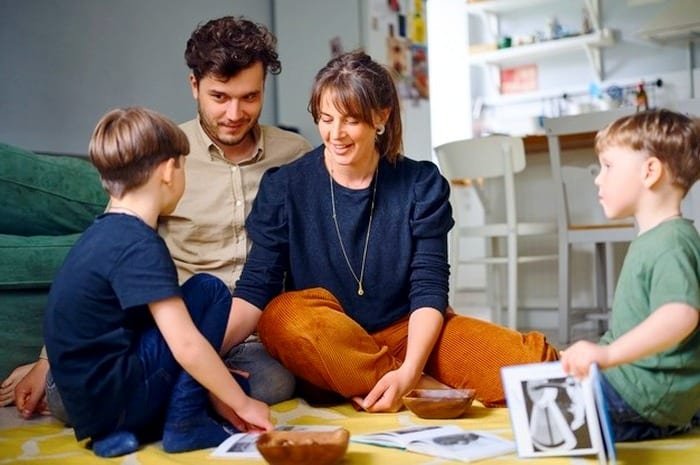Handling Children’s MistakesAnd the appropriate response in these situations
How do you react when your child makes a mistake? For example, during a soccer match, if they get a bad grade, or face any setback in life, how do you respond and what is your usual reaction?
Depending on the situation and what happens, parents react differently to their children. Some may focus on why the child made a mistake, while others get upset without listening to the child. Many families tend to make unfair judgments in these situations.
How do our reactions affect our children?
We may not realize it, but our responses to children’s failures have lasting impacts on them, influencing.Self-esteemand how they face challenges. Parents’ reactions to their children’s failures can also affect their intelligence.
If parents view their child’s mistakes positively, it can boost the child’s self-esteem and intelligence, greatly influencing their perception of their own abilities.

How to Handle Children’s Mistakes
But how can parents convey the right message?
In this section of the siteSelMagzwe present important methods to help you respond correctly to children’s mistakes.
Pay attention to your child’s reactions
Before anything else, consider how your child reacts to their failure. Are they happy that they tried their best? Are they upset with themselves? Are they scared or worried? Try to manage their feelings so they can motivate themselves for the next time.
Focus on the future
Instead of discussing the past or their failures, talk about how they can do better next time. Remind your child that every mistake can lead to future success.
Examine your own behavior
and reflect on how you previously handled your child’s mistakes. Do you think your advice was useful? Did you speak to them calmly and supportively, or did you act negatively? Instead of discouraging them, provide encouragement.
Emphasize their effort over the outcome
Discuss the positive aspects of what your child is passionate about, and as mentioned in SelMagz, try to keep their mindset positive and help them find ways to gain energy for their tasks, focusing on their hobbies to improve their learning.

The response you should have when your child makes a mistake
Avoid feeling sorry for the child
Don’t show undue sympathy which can harm them by suggesting they are incapable. Instead, tell them you are sorry for what happened but that it’s a step towards future successes.
Consider their failures as lessons
Reassure your child that this outcome will not affect how others view them or their abilities. They can still excel in many areas.
Share your own experiences of failure and how you achieved great results afterward, reassuring them that everyone experiences setbacks.
Do something fun together
To help rebuild your child’s confidence, engage in activities they love and focus on strategies that will help them solve their problems better next time.
Avoid covering up their mistakes
Focus on resolving your own mistakes. You can guide them and remind them of your unconditional love, helping your child regain confidence knowing their family supports them no matter what mistakes they make.

The best and most appropriate way to handle children’s mistakes
Discuss the accidental nature of mistakes
For example, did they break a plate in the kitchen or accidentally get their clothes dirty? Before crushing your child’s spirit, remind them that these errors were completely accidental; children usually recognize their mistakes early on, and no child deliberately spills a water bottle.
Also, remind yourself that their mistake was unintentional, helping you maintain calmness, as everyone makes mistakes, including ourselves.
How many times have we forgotten our house keys or spilled a cup of water?
Thank your child
When your child acknowledges their mistake, verbally thank them. Yes, before criticizing them, appreciate that they realized their error; before advising them to pay more attention, it’s better to recognize they told you the truth.
Turn moments of error into learning opportunities.
Common mistakes among children can serve as lessons. When your child makes a mistake, do not induce feelings of shame. These mistakes can be very beneficial, so teach them what to do and what not to do. Teach your kids how to manage their emotions and allow them to make mistakes.
Prevent common mistakes
While you can’t prevent all mistakes, you can remind them of common errors to avoid, such as not playing in dirty places and showing them healthier activities, and not placing coffee cups or water glasses within reach.Coffeeor a glass of water should not be nearby.

Parents’ reactions after children’s mistakes
Don’t force them to correct themselves
Usually, nature teaches powerful lessons; show them that if they hurt someone, the world will also hurt them. When we protect our children from physical dangers, nature can demonstrate the consequences of their actions without any assistance from us.
Listen to their words before labeling
When your child makes a mistake in front of you, don’t rush to blame them or remind them of their error. Instead, listen to what they have to say and ask them to explain what happened, allowing them to reflect and express their experiences in their own words.
What’s the next step after these encounters with children’s mistakes?
Now that you understand how to behave in these situations from SelMagz, teach your child that if they behave differently next time, they will achieve a different result.
Tell them that they do not need to blame themselves for these errors or feel embarrassed. Instead, they can pursue another valuable task and remind them not to be overly idealistic but to do their best.
If we accept our mistakes positively, our child will learn to do the same, realizing that we are valuable human beings even when we make mistakes, which helps build their confidence throughout life.
The truth is children need to make mistakes to learn how to live, so teach your child how to walk, knowing they will fall many times at first.
Do you blame them in such situations?
No, blaming is absurd in these circumstances, and making mistakes is a part of life. You should accept mistakes, maintain your calm, avoid judgment, and trust that this experience teaches them an important lesson. Lastly, treat them gently. Instead of always criticizing or dictating, ask them if they would like to change their approach and allow them to express their opinions, fostering their self-confidence to improve next time.
Nothing is worse than a child being scolded by their parents, which can harm their relationships.
They make mistakes at school too, reducing their self-esteem and causing behavioral issues, such as littering out of car windows. Therefore, all of your child’s behavior in the future depends on you, so be very careful.







